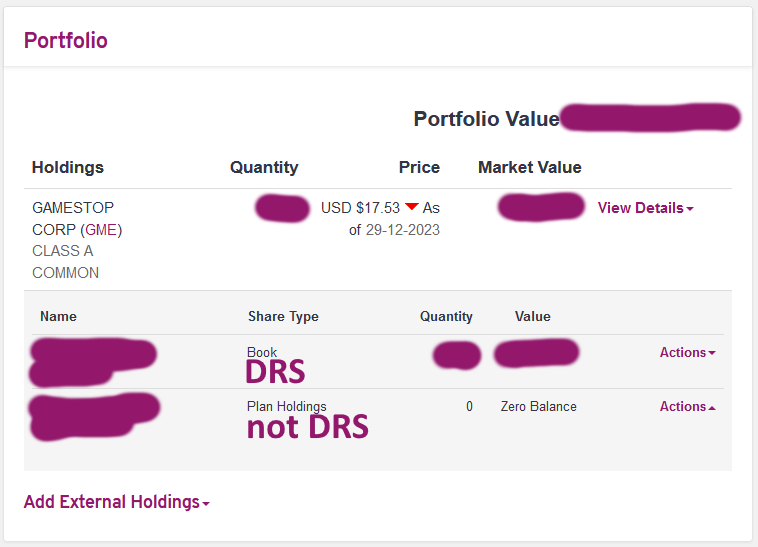Recently there have been some great discussions about the important distinction between Plan shares (aka DirectStock aka DSPP), and DRS shares.
Plan is not DRS.
- Why are DRS numbers stagnant? Exploring the possibilities … Plan is not DRS - post by Chives on December 8
- Plan is not DRS - post on superstonk on December 22 by jackofspades123 based on the original post by Chives.
Regarding the distinction between Plan shares (not DRS) and DRS shares, the term “plan versus book” (or “book versus plan”) is a term often used to refer to this.
In the context of holding DRSd shares of GME with Computershare, if your shares are DRS shares, it will show as ‘Book’ under share type, and if your shares are in Plan (not DRS), it will show as ‘Plan holdings’ under Share Type.

This is likely the original source of the term “Plan versus Book”, to address the distinction between these two types of holdings in a Computershare account.
“Plan versus Book” is a misnomer.
“Book” means Book-Entry (or Paperless) Securities.
“Book-entry securities are investments such as stocks and bonds whose ownership is recorded electronically.” That’s it.
The following are examples of book-entry securities:
- shares of GME in a brokerage account
- shares of GME in DSPP / Plan through Computershare
- shares of GME in DRS.
All of these types of holding are recorded electronically and they are all book-entry.
So, when the term “Plan versus Book” is used, it is a misnomer because plan shares are book-entry shares, and “Book”, usually intended to refer to “pure DRS” in this context, also just means book-entry shares.
Both types are book-entry, but they are not both DRS.
TLDR:
“Plan versus DRS” is more accurate
“Plan versus DRS” is a term that more accurately refers to the distinction of shares held in Plan (book-entry, not DRS) and shares held in DRS (book-entry, DRS).
I tried to push for the plan versus DRS titling last year, but was told it was unfair to plan and made it look like I was bashing plan holdings.
It’s not my fault plan isn’t DRS!
The existence of so many hoops between real DRS and pseudo-DRS is astonishing.
Fuck the DTC and their counterfeiting schemes💎✌️
Thank you for clarifying. I did not realize that both were technically book-entry. Plan vs DRS!
Yeah, it’s pretty confusing - and one would think there would be a push to make it much easier to understand with language that didn’t make it so confusing. The cynic may say the language and wording is purposefully misleading/confusing.




